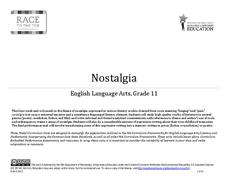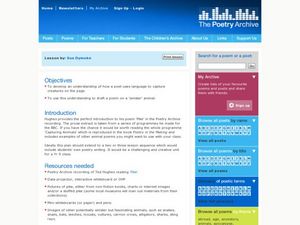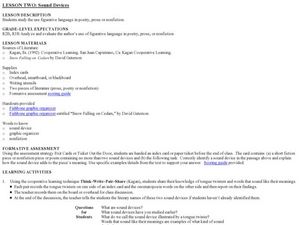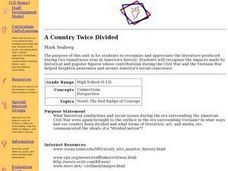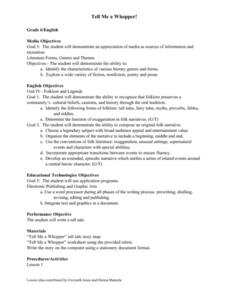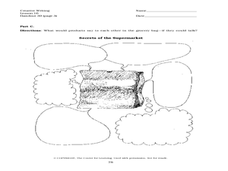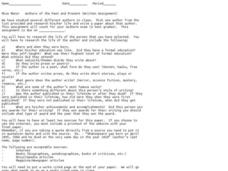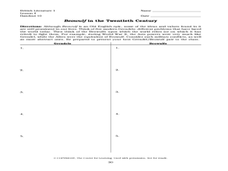Annenberg Foundation
Poetry of Liberation
How do writers use words to protest injustice, challenge the status quo, and shape their own identities? Individuals watch and discuss a video, read author biographies, write poetry and journals, develop a slideshow, and complete a...
Curated OER
Irony in Poetry and Prose (Fiction and Non-fiction Texts)
Middle and high schoolers examine the impact of irony in poetry and prose. In this figurative language lesson, they read instructor-selected literature and identify uses of irony. Then they discuss how irony enhances literature.
Curated OER
Comparing Fiction and Nonfiction
Fifth graders compare and contrast an informational article with a fictional story. They read the story "The Contest" as a class, and discuss the different types of literature genres. Next, they complete a vocabulary worksheet and a...
Curated OER
Sound Devices in Poetry, Fiction and Nonfiction
Students examine the impact of sound devices in poetry. In this poetry lesson, students read the listed poems and identify uses of alliteration, repetition, consonance, rhythm, rhyme, and slang. Students discuss how sound devices enhance...
Massachusetts Department of Education
Nostalgia
To prepare for crafting their own memoir, class members examine poetry by Margaret Atwood, Billy Collins, Robert Hayden, and Claude McKay, stories by Richard Rodriquez and Willa Cather, and Barry Levinson's film Avalon. They examine...
Curated OER
Ted Hughes "Pike"
Middle schoolers analyze how a poet uses language to capture creatures and draft a poem on a 'sinister' animal. In this poetry analysis lesson, students read Ted Hughes' poem 'Pike' and analyze pictures of pike fish. Middle schoolers use...
Curated OER
Sound Devices
Learners examine the impact of sound devices in poetry, prose, and non-fiction. In this figurative language lesson, students read instructor-selected literature and identify uses of alliteration, repetition, consonance, rhythm, rhyme,...
Curated OER
Hiroshima and Nagasaki: Still Teaching Lessons To This Generation
Discuss Laurence Yep's novella, Hiroshima, to inspire future historical fiction writers.
Curated OER
In the Eye of the Tiger
Young scholars read about tigers in both fiction and nonfiction, poetry and prose. They study tiger markings in photographs of living tigers to create a sculptural mask reflecting their knowledge of tiger markings. Afterward, they write...
Curated OER
Lesson Two: Rock N Rhythm & Rhyme (Part Two)
Second graders find rhythm and rhyme in poetry. In this poetry lesson, 2nd graders listen to different poems to find the rhyming words. They play a memory game and try to find two words that rhyme.
Curated OER
Rollin’ on the River: Identifying Jargon
Students identify jargon in poetry, prose and fiction. In this literature lesson, students will read selections from Mark Twain and identify figurative langauge, focusing on jargon.
Curated OER
Applying SQ3R to Texts
After a review of the SQ3R strategy, readers use the provided prompts to respond to a text. The value of this worksheet is in the additional questions that move the learner into higher levels of reasoning.
Curated OER
A Country Twice Divided
Learners study biography from the 19th century. They read "The Red Badge of Courage." Students research a topic from the list provided in the lesson and write a 5-7 page paper. They study lyrics and melodies of the confederacy and...
Curated OER
The Stinky Cheese Man and Other Fairly Stupid Tales
Sixth graders demonstrate the ability to process and evaluate content from a variety of sources and apply comprehension skills to the material read. They organize information for practical use and design and develop an informational...
Lesson Planet
New Books for Black History Month
Suggested books to help students better understand African American history.
Curated OER
Painted Dreams
Third graders explore the importance of art in Haitian culture by analyzing the cause and effect within the story, "Allie's Basketball Dream." They examine all the aspects of the story and characters including their goals, dreams,...
Curated OER
Autobiographical Postage Stamp
Pupils design a postage stamp that communicates to the world who they are, what they hope to be, what they are good at, and factual information. They use, "My Great Aunt Arizona" by Gloria Houston as a model for a biography.
Curated OER
Tell Me a Whopper!
Sixth graders investigate tall tales as a literary genre. They listen to a number of tall tales to discover how exaggeration is used as a story element. They write and publish a tall tale using word processing software. They illustrate...
Curated OER
The Verbal Sketch
Learners use perspective observation sketches to understand verbal description. In this subjective writing lesson, students practice writing subjective conversations using the cartoon worksheets.
Curated OER
Authors of the Past and Present
Learners research a chosen author. In this authors instructional activity, students pick one author from the list provided, do research, and write a paper.
Curated OER
The Concept of the Hero
Students explore the symbolic implications for the concept of the hero with a focus on the Beowulf theme. In this hero concept lesson, students find specific examples of monsters from Beowulf to complete the chart. Students list the...
Curated OER
Carson McCullers: Loneliness and Frustrated Love
Students examine the themes of loneliness and frustrated love in the work of Carson McCullers. In this theme analysis lesson, students complete a comparison of patterns in the novels of McCullers as a part of a theme analysis.
Curated OER
Twenty-one Balloons
Fifth graders determine what the Newbery Award is and why it is importance. They examine a number of Newbery Award winning books and listen to a book talk about William Pene DuBois', Twenty-One Balloons while watching a PowerPoint...
Curated OER
Make Way for Ducklings
First graders use skills to collect, organize, and interpret data. They compare and contrast two stories, Make Way for Ducklings and Chibi: A True Story From Japan. Students create a duckling.




